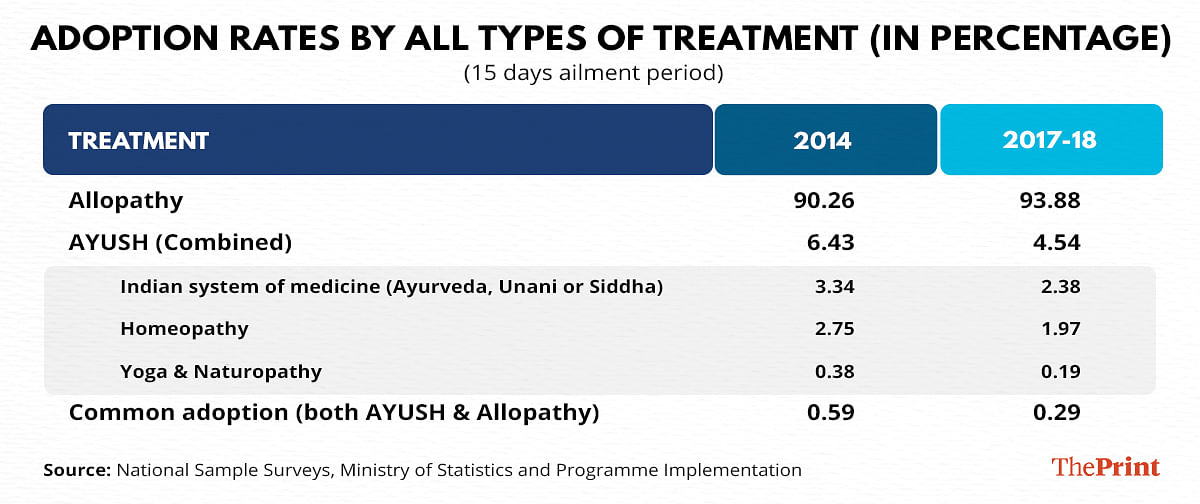The recognition of 21 June as the International Day of Yoga by the United Nations has significantly elevated the relevance of AYUSH systems, which encompass Ayurveda, yoga and naturopathy, Unani, Siddha, and homoeopathy.
With the increasing efforts of the government and various organisations to promote the use of traditional Indian medicine, also known as AYUSH, it has become an important tool in improving health. The Covid-19 pandemic has further demonstrated the potential of AYUSH systems as an effective solution. The National Health Policy, 2017 supported its integration into mainstream healthcare, and the positive push has led to the increased recognition of AYUSH systems.

But available data shows that these initiatives have not changed the mindset of people. The National Sample Survey (NSS), conducted by the Ministry of Statistics and Programme Implementation, shows low adoption and acceptance of AYUSH systems by the majority of the population. This was observed in surveys conducted under the 71st round titled “Social Consumption: Health” in 2014 and the 75th round titled “Household Social Consumption: Health” survey in 2017-18.
This analysis is exclusively limited to outpatient settings as the proportion of inpatients in total is extremely low. As per the survey findings, among outpatients seeking treatment, a small proportion of 6.43 per cent adopted AYUSH systems of medicine in 2014 compared to the overwhelming majority of 90.26 per cent who preferred allopathic medicine. What is more alarming is that the adoption rate of AYUSH decreased to 4.54 per cent in 2017-2018. The data also shows that the population co-opting both AYUSH and allopathic systems as a form of treatment is negligible.
Also read: Indians tried new-age Keto, Atkins, Paleo, low-carb. Now they’re going back to Ayurvedic diet
State-wise analysis of AYUSH adoption
The decrease in AYUSH adoption was prevalent in most states and territories, with the exception of Bihar, Jammu & Kashmir, Madhya Pradesh, Manipur, Punjab, Uttarakhand, Delhi, Sikkim, Assam, Karnataka, and Pondicherry. These states recorded an increase in the use of AYUSH systems as a form of treatment. The data also indicated that the decline and the increase in adoption was consistent across all economic groups, regardless of socioeconomic status.
Several data-related issues may have contributed to the survey findings on the limited acceptance of AYUSH systems of medicine. One such reason is that the respondents of these surveys are those who suffered from an ailment in the 15 days prior to the date of the survey. The survey covers expenditure on allopathy or AYUSH systems of medicine only if an ailment is reported. The routine expenditure on AYUSH medicines, which is largely incurred for preventive care or even out of habit, is not covered in these surveys.
Moreover, significant adoption of AYUSH is likely to bear no cost at all, like practising yoga, consuming self-grown plants such as tulsi and aloe vera, drinking turmeric milk, ginger tea, etc. The adoption of such traditional practices is also not reported in any government or non-government data.
In conclusion, despite the efforts to promote AYUSH, hard data from government surveys shows a decline in the adoption of these systems compared to allopathic medicine.
It is mainly because these surveys are not designed specifically to capture the adoption of AYUSH.
Factors such as a lack of regulation, standardisation of these alternative medicine systems, and limited scientific evidence to support their efficacy may also have contributed to their limited usage.
The data collected through such large-scale surveys have important policy implications in healthcare, its provisions, usage, and potential benefits. They highlight the need for better efforts to increase awareness and address the challenges that prevent wider adoption.
If the available data is to be believed, there is a need to promote greater integration of AYUSH systems with allopathic medicine to provide a more holistic and integrated approach to healthcare. With the right policies in place, it may be possible to reverse the declining trend and ensure that AYUSH systems play a more significant role in improving the health and well-being of the people of India.
It is important to continue promoting the benefits of these systems while also working to address the challenges to ensure they are accessible and accepted as effective forms of treatment.
Palash Baruah is Associate Fellow and Poonam Munjal is Professor at National Council of Applied Economic Research (NCAER), Delhi.
(Edited by Ratan Priya)



